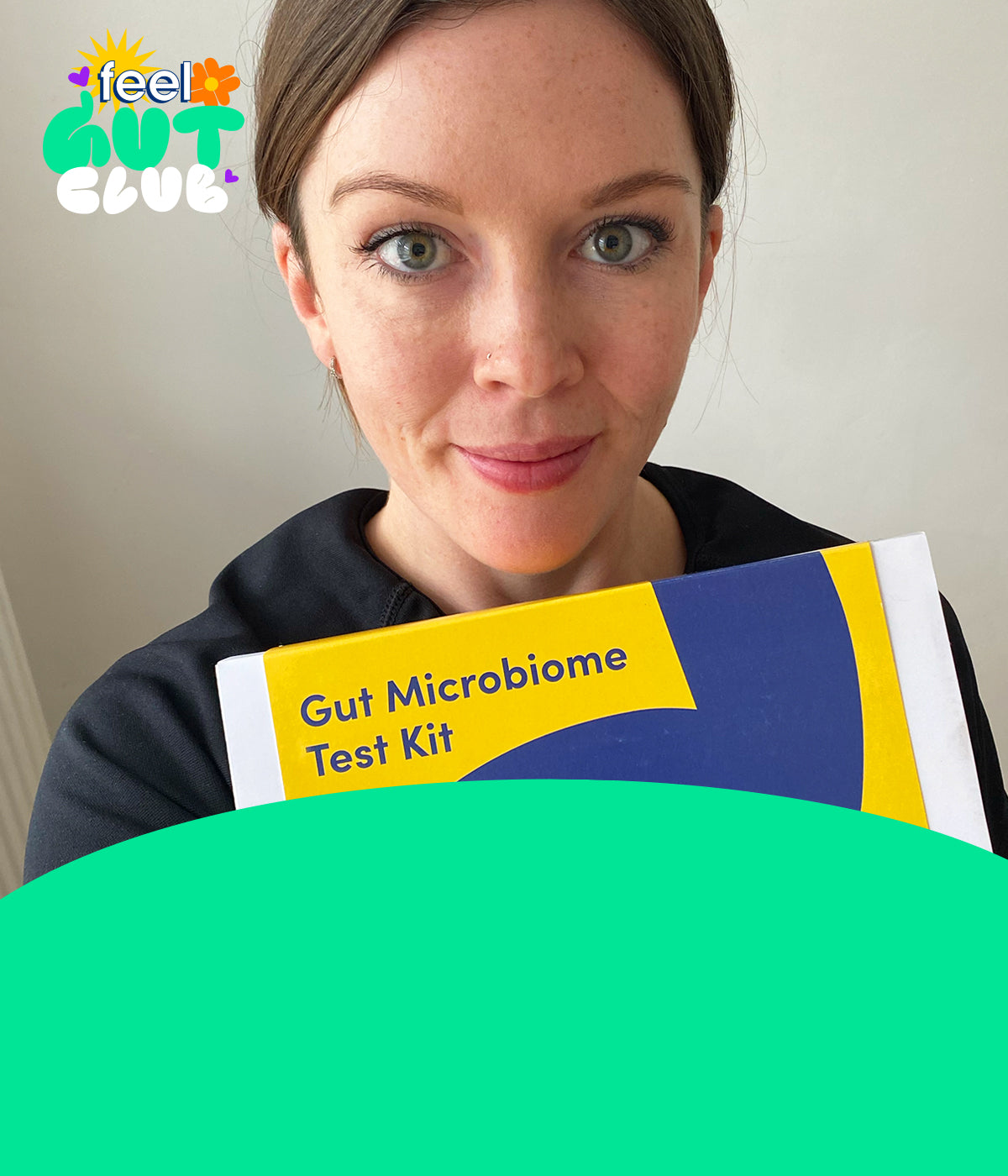This product has no reviews yet.
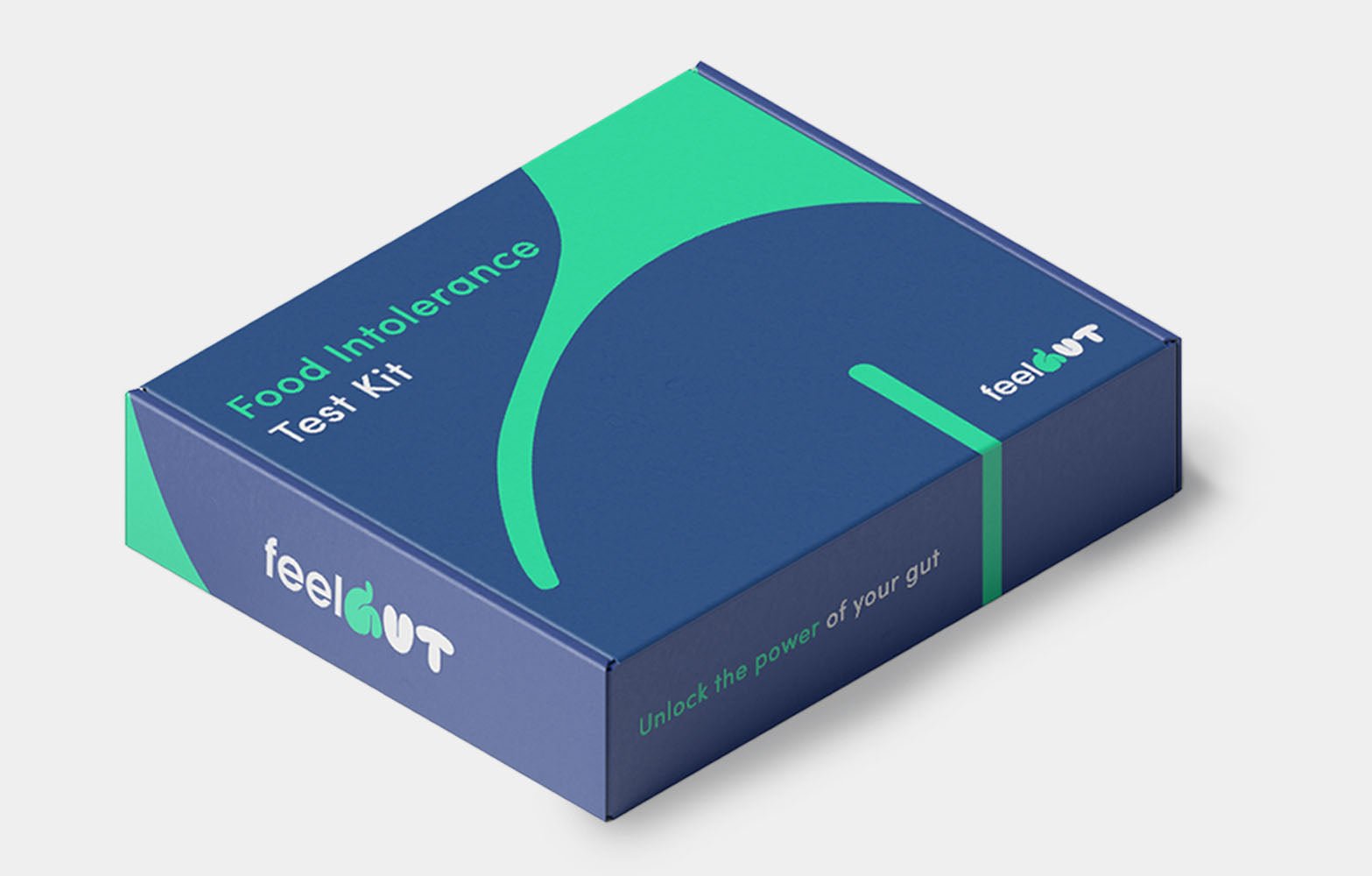

Food intolerance test
Free shipping both ways included in the price!
From the date our lab receives your sample.
Our Food Intolerance test is designed to provide information and should not substitute professional medical advice as a diagnosis.

270 foods tested
Dairy, milk and eggs
Grains (Gluten and non-gluten)
Nuts and seeds
Meat
Fish and seafood
Herbs and spices
Fruits and berries
Vegetables
Mushrooms and supplements
Other ingredients
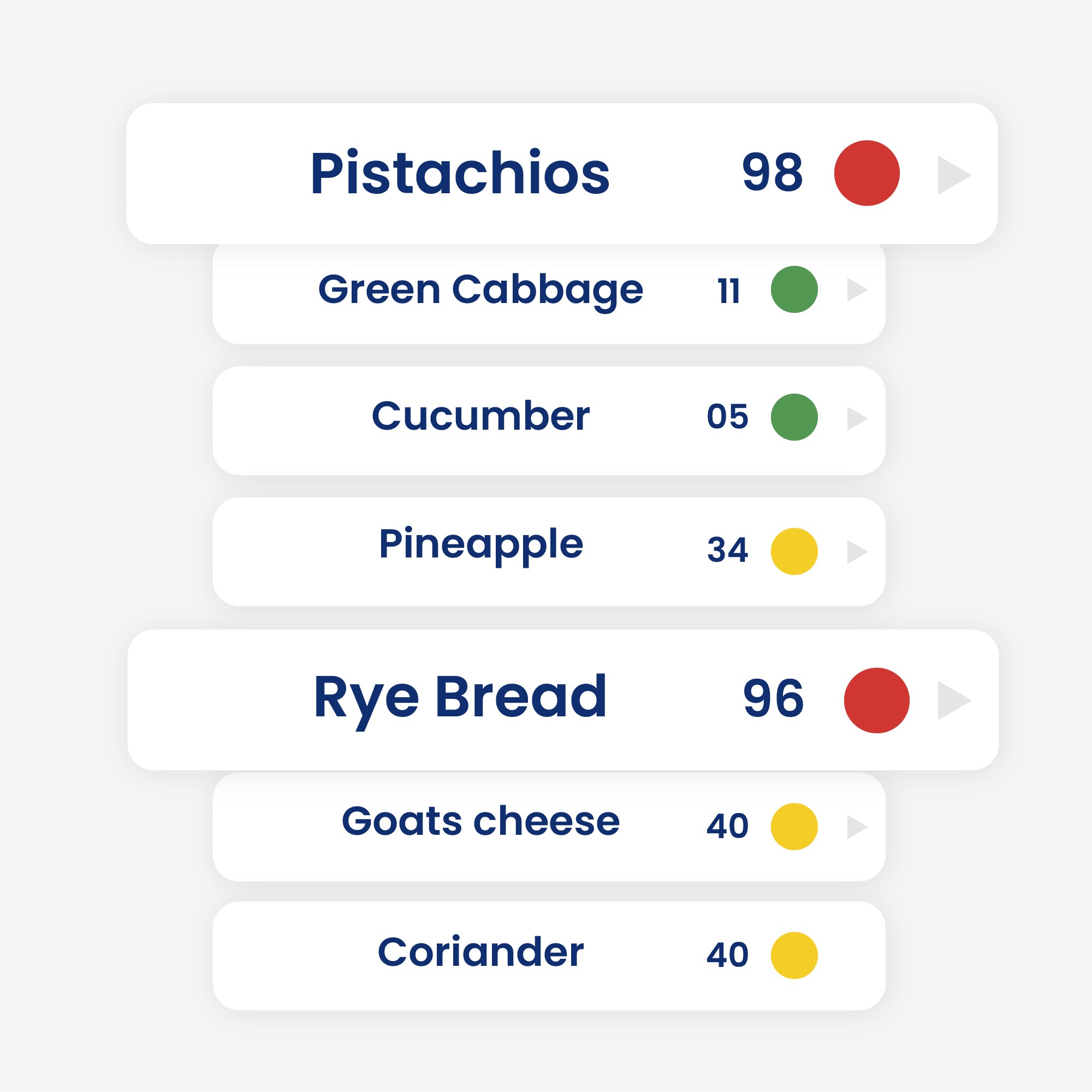
Easy to understand results
What will a food intolerance test tell me?
After completing the test, you'll receive a personalised report showing your body's immune responses to 272 foods, organised into clear, simple categories.
All foods are colour coded and labelled as okay to eat, reduce slightly / limit, or avoid, making it easy to understand which foods may be triggering your symptoms.
These results give you practical insight into which foods are best suited to you and which ones you may want to adjust in your diet to support your overall wellbeing.
View sample reportTake control of your symptoms
Join the feel gut club
How to take the test
Taking the test is really simple, just follow the 4 steps below. More detailed instructions are included inside every test box when you receive your test kit.
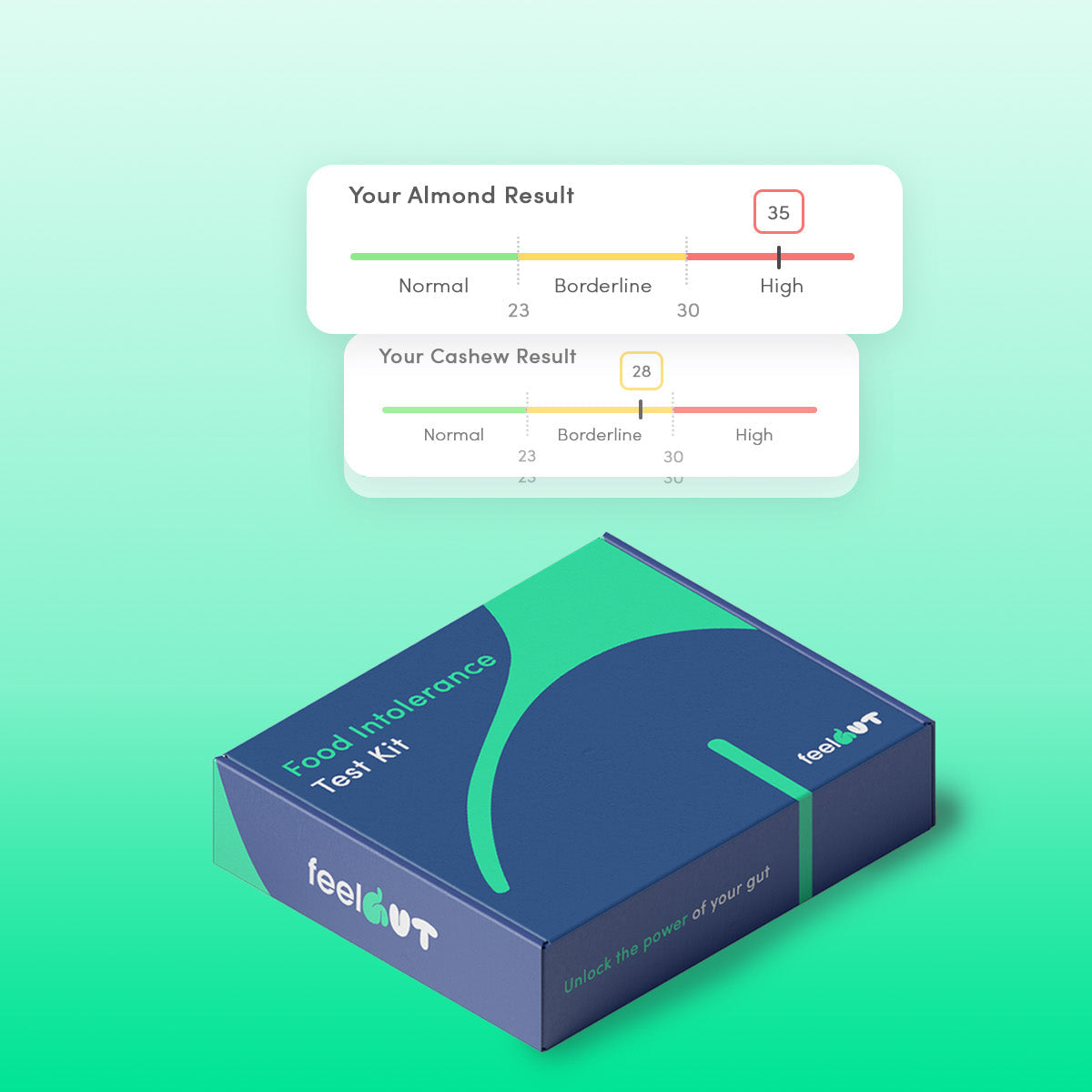
Order your food intolerance test kit
Buy your kit online, we'll send everything you need directly to your door within 2 working days.

Collect your blood sample
Just a simple prick of the finger. Full instructions included inside every kit to walk you through how to do the test.

Send your kit back
We'll provide you with a prepaid UK shipping label so you can send your sample back to our UK based lab
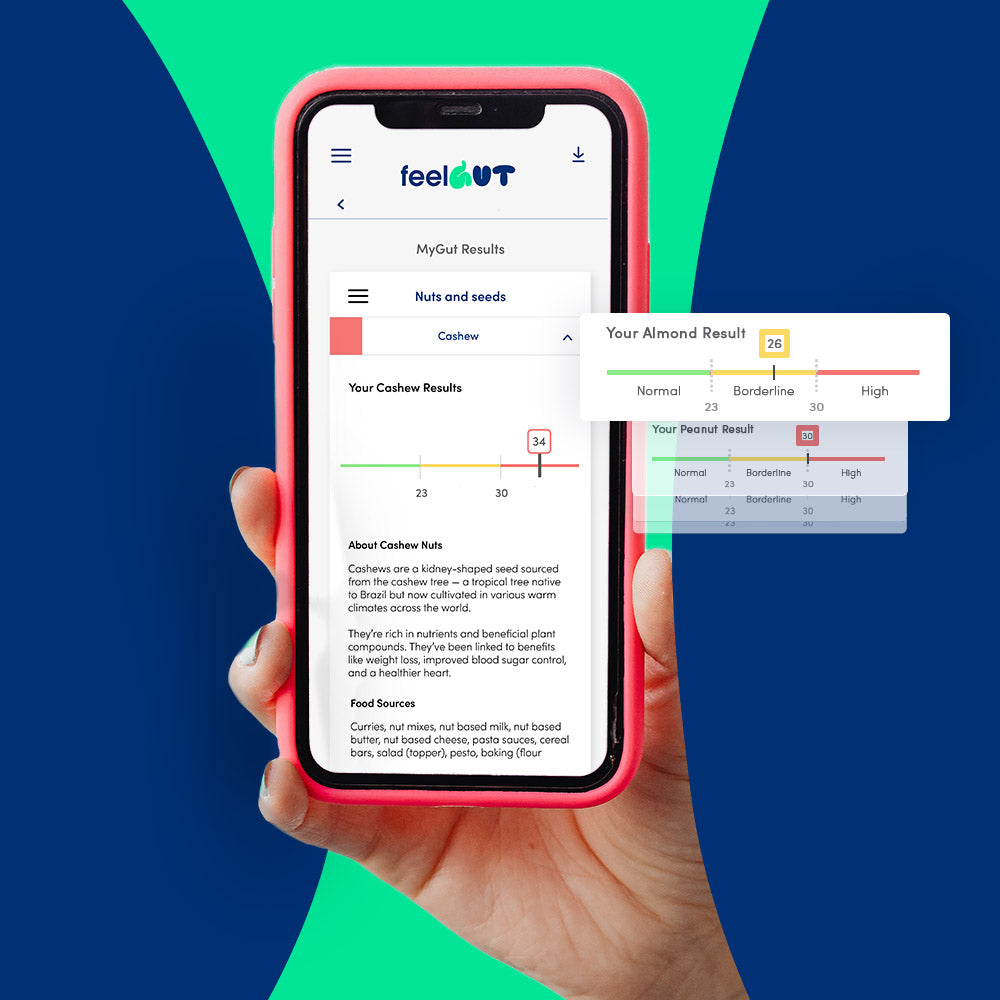
Receive your results
Results will be sent directly to your email address 5 days from the point our lab received your sample.
Experts at the forefront of gut health

What is a food intolerance test?
A food intolerance finger-prick blood test is a simple at-home test that measures how your immune system responds to foods you regularly eat. Using a small drop of blood collected from your fingertip, the sample is analysed in a laboratory to measure all four IgG antibody subtypes (IgG1, IgG2, IgG3 and IgG4) against 272 different foods.
By looking at these immune responses, the test provides clear, easy-to-understand insights that can help you identify foods that may be triggering symptoms and enables you to make more informed dietary choices.

We make it personal to help you feel gut
Personalised results and advice specific to your test results. Learn how to permanently eliminate troublesome foods from your diet.
How it worksFAQ's
How does a food intolerance blood test work?
A food intolerance blood test is designed to identify sensitivities caused by certain foods by measuring the body's natural IgG (immunoglobulin G) response when those foods are consumed.
IgG is the most common antibody found in the blood; antibodies are natural proteins that are produced by your immune system that protect you when an unwanted substance enters your body.
The test requires a blood sample to be taken which is then exposed to a panel of specific foods in our lab, we expose your blood to over 270 different types of food. If IgG levels become elevated when exposed to specific foods, this suggests a stronger immune response or intolerance to those foods.
What can I learn from my results?
Your results will include your reactivity levels to all 270+ foods that we test for. All foods are grouped into normal, borderline and elevated reactivity levels so you can easily identify your problem foods.
You will receive both a digital and printable version of your results.
Can this test tell me if I am lactose intolerant?
Our food intolerance test measures dairy specific IgG antibody reactions across foods such as cow's milk, goat milk, and sheep's milk. Our test does not specifically measure lactase (the enzyme that breaks down lactose), instead it can identify a dairy intolerance.
A gut microbiome health test kit can help to identify a lactose intolerance and will provide more comprehensive insights into how your diet and lifestyle may be influencing your overall health.
Can the test tell me if I am gluten intolerant?
Our test will show if you have an intolerance to many gluten containing grains including barley, wheat, rye, malt, oat, durum wheat, gliadin, spelt, couscous and wheat bran.
The test will also identify whether gluten containing grains are the cause of your symptoms or whether they are caused by another food type.
How much is the food intolerance test?
We offer 2 options, the standard food intolerance test priced at £250 or our comprehensive food intolerance test that measures 270 different types of foods for £300.
How long will it take to get my results?
You will receive your results in 2-5 working days once our lab has received your blood sample.
When will my symptoms improve?
Once you have identified the foods that trigger your symptoms and removed them from your diet, your symptoms can improve quickly if you are no longer coming into contact with the foods that triggered your symptoms. However everyone responds differently, for others it may take days, weeks or months.
Can I take the test if I am pregnant?
No, nutrition during pregnancy is more important than ever, we do not recommend making any major adjustments to diet and lifestyle during this time. It is also common for food intolerances to arise during pregnancy and cause symptoms such as acid reflux.
Can anyone take the test?
To take the test you need to live in the UK. This is because our labs are based in the UK and need to receive your blood sample as fast as possible.
How do I take the test?
We will send you a finger-prick collection kit to take your blood sample. The kit will include everything you need to take the test. Simply prick your finger, collect your blood, and send it back to our lab on the same day using the pre-paid return shipping label.
Step-by-step instructions will also be included in your test kit.
When is the best time to take the food intolerance test?
We recommend taking your blood sample in the morning and sending it back to us on the same day.
Do I need to fast before I take the test?
No, you do not need to fast before you take the test.
Where can I get a food intolerance test?
You can buy a test online from a number of providers. We recommend ensuring that the test is a blood test and is analysed by an ISO accredited lab within the UK.
Is this test suitable for children?
This test can be used by anyone over the age of 2 years old. However, for children, we would recommend our gut microbiome test which is a more comprehensive test and comes with a full nutrition and supplement plan developed by our team.
Blog posts

What are the symptoms of a food intolerance?
Food intolerances can have several symptoms, the severity and combinations of symptoms can vary throughout individuals, with some experiencing multiple symptoms at once.

What is a food intolerance? Everything you need to know
Medically reviewed by Kate Hilton RDOn 12 June 2023 In this guide we will explore the topic of food intolerance and provide detailed insight into, common food intolerances, symptoms, trigge...

Medically reviewed by Kate Hilton RDOn 12 June 2023 Understanding the causes, symptoms, diagnosis, and management of gluten intolerance Gluten intolerance is one of the most common forms of...
Authored by

Reviewed by













